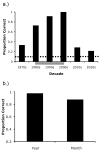A calendar savant with episodic memory impairments
- PMID: 20104390
- PMCID: PMC2917639
- DOI: 10.1080/13554790903405701
A calendar savant with episodic memory impairments
Abstract
Patients with memory disorders have severely restricted learning and memory. For instance, patients with anterograde amnesia can learn motor procedures and retain some restricted ability to learn new words and factual information. However, such learning is inflexible and frequently inaccessible to conscious awareness. Here we present a case of patient AC596, a 25-year-old male with severe episodic memory impairments, presumably due to anoxia during a preterm birth. In contrast to his poor episodic memory, he exhibits savant-like memory for calendar information that can be flexibly accessed by day, month, and year cues. He also has the ability to recollect the exact date of a wide range of personal experiences over the past 20 years. The patient appears to supplement his generally poor episodic memory by using memorized calendar information as a retrieval cue for autobiographical events. These findings indicate that islands of preserved memory functioning, such as a highly developed semantic memory system, can exist in individuals with severely impaired episodic memory systems. In this particular case, our patient's memory for dates far outstripped that of normal individuals and served as a keen retrieval cue, allowing him to access information that was otherwise unavailable.
Figures



Similar articles
-
Severely deficient autobiographical memory (SDAM) in healthy adults: A new mnemonic syndrome.Neuropsychologia. 2015 Jun;72:105-18. doi: 10.1016/j.neuropsychologia.2015.04.012. Epub 2015 Apr 17. Neuropsychologia. 2015. PMID: 25892594
-
The contribution of the left anterior ventrolateral temporal lobe to the retrieval of personal semantics.Neuropsychologia. 2018 Aug;117:178-187. doi: 10.1016/j.neuropsychologia.2018.06.002. Epub 2018 Jun 4. Neuropsychologia. 2018. PMID: 29879423
-
Personal semantics: Is it distinct from episodic and semantic memory? An electrophysiological study of memory for autobiographical facts and repeated events in honor of Shlomo Bentin.Neuropsychologia. 2016 Mar;83:242-256. doi: 10.1016/j.neuropsychologia.2015.08.013. Epub 2015 Aug 13. Neuropsychologia. 2016. PMID: 26277459
-
[Physiopathology of autobiographical memory in aging: episodic and semantic distinction, clinical findings and neuroimaging studies].Biol Aujourdhui. 2010;204(2):159-79. doi: 10.1051/jbio/2010011. Epub 2010 Jun 21. Biol Aujourdhui. 2010. PMID: 20950560 Review. French.
-
[Episodic autobiographical memory in depression: a review].Encephale. 2006 Oct;32(5 Pt 1):781-8. doi: 10.1016/s0013-7006(06)76231-5. Encephale. 2006. PMID: 17099603 Review. French.
Cited by
-
Brief Report: Two Day-Date Processing Methods in an Autistic Savant Calendar Calculator.J Autism Dev Disord. 2016 Mar;46(3):1096-102. doi: 10.1007/s10803-015-2626-z. J Autism Dev Disord. 2016. PMID: 26476739
References
-
- Baddeley AD, Emslie H, Nimmo-Smith I. Doors and People. A test of visual and verbal recall and recognition. Bury St. Edmunds, UK: Thames Valley Test Company; 1994.
-
- Barrett RD, Bennet L, Davidson J, Dean JM, George S, Emerald BS, et al. Destruction and reconstruction: Hypoxia and the developing brain. Birth Defects Research Part C: Embryo Today: Reviews. 2007;81(3):163–176. - PubMed
-
- Brandt KR, Gardiner JD, Vargha-Khadem F, Baddeley AD, Mishkin M. Using semantic memory to boost “episodic” recall in a case of developmental amnesia. NeuroReport. 2006;17:1057–1060. - PubMed
Publication types
MeSH terms
Grants and funding
LinkOut - more resources
Full Text Sources
Medical
Miscellaneous
